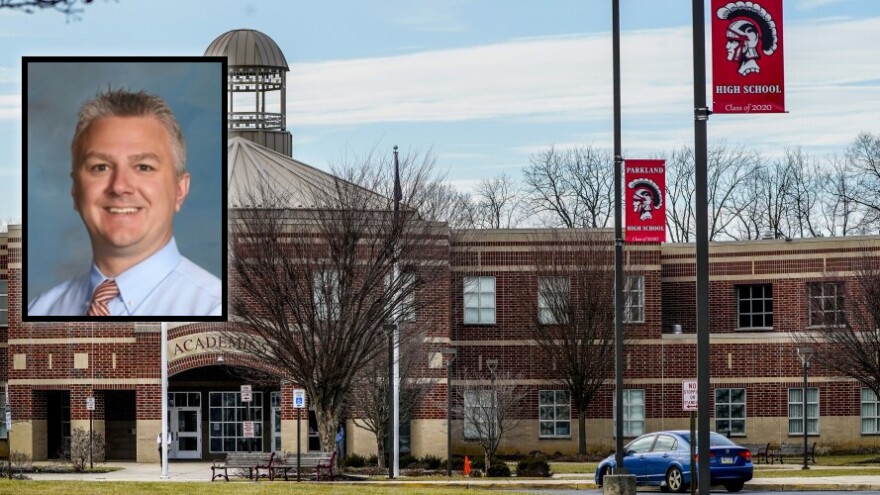ALLENTOWN, Pa. – A Lehigh County detective testified Monday during a hearing that could determine whether Francis Anonia, Parkland School District's former performing arts administrator, goes to trial on charges he illegally recorded a student in a theater dressing room.
Anonia, 44, of Allentown, faces 19 criminal charges in all, including invasion of privacy, unlawful recording and criminal use of a communications facility.
County detectives say they found videos on Anonia’s cell phone secretly recording a Parkland High School student changing clothes in a dressing room during rehearsals for a school musical.
In August, Anonia’s attorney, Richard Coble, asked Lehigh County Judge Robert Steinberg to throw out any evidence retrieved from the phone, arguing that investigators obtained and searched the device illegally.
Coble contends that a form Anonia signed did not give permission for county detectives to keep his cell phone, and that a search warrant investigators received before searching the phone fails to meet the legal standard for probable cause.
Cell phone seized in separate probe
Evidence from the cell phone forms the backbone of prosecutors’ case.
According to court documents, Allentown detectives seized Anonia’s cell phone in February 2023, more than a year before Anonia’s arrest, as part of an investigation into William Marshall, Anonia’s 30-year-old fiance who previously lived in Anonia’s Allentown home.
Anonia was not charged in connection with that investigation, but he never got his phone back.
Lehigh County detectives began investigating him in April 2024, after receiving a ChildLine report that Anonia made sexually suggestive comments to a student, according to court filings.
As part of that investigation, Detective Gregg Dietz interviewed Anonia on April 16, 2024. During the interview, Anonia signed a form “abandoning” his cell phone, prosecutors said.
Dietz testified Monday that both he and Anonia understood the form as giving investigators permission to wipe the phone and destroy it. County investigators fully intended to destroy the phone, Dietz said, but never got around to it.
A three-minute clip of Dietz’s interview with Anonia does not show the detective explaining that authorities may search Anonia’s phone if he turns it over for destruction.
Instead, he presents two options — allow police to search his phone and get it back, or allow authorities to destroy it.
More Childline reports accusing Anonia of misconduct followed in early May of 2024, Dietz told the court, leading investigators to seek a new warrant to search his devices instead of destroying them.
Defense: Prosecution's case in jeopardy
Coble argues that Anonia did not freely and knowingly grant authorities permission to hold on to his phone, and that the warrant investigators obtained did not meet the legal threshold to allow a search.
If the court finds problems with either the search warrant or Anonia’s consent to abandon his phone, Coble said, it would represent a fatal blow to the prosecution’s case.
Chief Deputy District Attorney Sara Moyer, the prosecutor overseeing the case, disagreed Monday, saying that both the warrant and the document Anonia signed in April 2024 “provide us access” to the phone’s contents.
Anonia knowingly and willingly signed over his cell phone, Moyer told the court, and when investigators gathered new information and received new reports, they sought a correctly executed warrant to search the phone.
With testimony complete on the motion to exclude evidence, Coble has 30 days to submit a filing laying out his argument as to why it should be thrown out.
Once he submits the filing, Moyer has a further 14 days to submit a response on the prosecution’s behalf.
If Judge Steinberg ultimately allows prosecutors to use evidence from Anonia’s phone, the case is scheduled to proceed to trial on Dec. 1. If Steinberg throws out the evidence, the trial will not take place as scheduled, the judge said.
Coble suggested his client and prosecutors could reach a plea deal soon after the evidence question is resolved, depending on how the judge rules.


